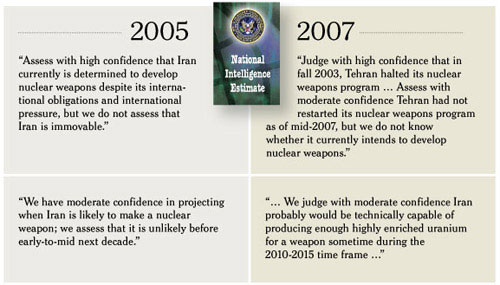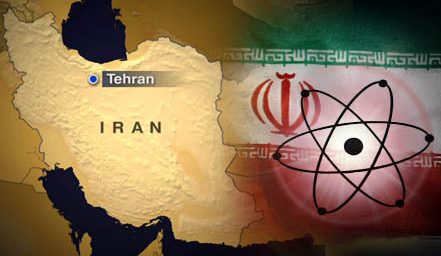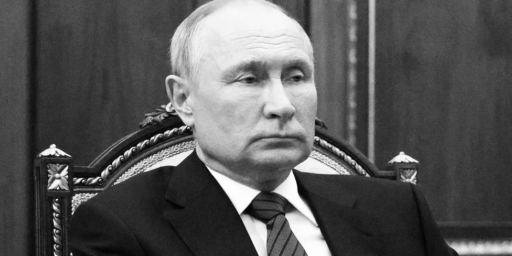Fallout From NIE Iran Nuke Assessment

Rarely, if ever, has a single intelligence report so completely, so suddenly, and so surprisingly altered a foreign policy debate here. An administration that had cited Iran’s pursuit of nuclear weapons as the rationale for an aggressive foreign policy — as an attempt to head off World War III, as President Bush himself put it only weeks ago — now has in its hands a classified document that undercuts much of the foundation for that approach.
The impact of the National Intelligence Estimate’s conclusion — that Iran had halted a military program in 2003, though it continues to enrich uranium, ostensibly for peaceful uses — will be felt in endless ways at home and abroad.
It will certainly weaken international support for tougher sanctions against Iran, as a senior administration official grudgingly acknowledged. And it will raise questions, again, about the integrity of America’s beleaguered intelligence agencies, including whether what are now acknowledged to have been overstatements about Iran’s intentions in a 2005 assessment reflected poor tradecraft or political pressure. Seldom do those agencies vindicate irascible foreign leaders like President Vladimir V. Putin of Russia, who several weeks ago said there was “no evidence” that Iran was building a nuclear weapon, dismissing the American claims as exaggerated.
Peter Baker and Robin Wright add:
The new intelligence report released yesterday not only undercut the administration’s alarming rhetoric over Iran’s nuclear ambitions but could also throttle Bush’s effort to ratchet up international sanctions and take off the table the possibility of preemptive military action before the end of his presidency.
Iran had been shaping up as perhaps the dominant foreign policy issue of Bush’s remaining year in office and of the presidential campaign to succeed him. Now leaders at home and abroad will have to rethink what they thought they knew about Tehran’s intentions and capabilities.
“It’s a little head-spinning,” said Daniel Benjamin, an official on President Bill Clinton’s National Security Council. “Everybody’s going to be trying to scratch their heads and figure out what comes next.”
Critics seized on the new National Intelligence Estimate to lambaste what Democratic presidential candidate John Edwards called “George Bush and Dick Cheney’s rush to war with Iran.” Senate Majority Leader Harry M. Reid (Nev.), echoing other Democrats, called for “a diplomatic surge” to resolve the dispute with Tehran. Jon Wolfsthal, a scholar at the Center for Strategic and International Studies, termed the revelation “a blockbuster development” that “requires a wholesale reevaluation of U.S. policy.”
Many are digging in, though. Meyers again:
The findings, though, remain open for interpretation, as they always do, even in documents meant to reflect the consensus of the intelligence community. When it comes to Iran, at odds with the United States on many fronts beyond the nuclear question, hawks remain.
“Those who are suspicious of diplomacy are well dug in in this administration,” said Kurt M. Campbell, chief executive officer of the Center for a New American Security.
Victor Davis Hanson is fighting a two front war: Since our intelligence estimates are so often wrong, the neocons might still be right about Iran’s nukes. And, if not, it’s only because the neocons were right on Iraq!
The latest news from Iran about the supposed abandonment in 2003 of the effort to produce a Bomb — if even remotely accurate — presents somewhat of a dilemma for liberal Democrats.
Are they now to suggest that Republicans have been warmongering over a nonexistent threat for partisan purposes? But to advance that belief is also to concede that, Iran, like Libya, likely came to a conjecture around (say early spring 2003?) that it was not wise for regimes to conceal WMD programs, given the unpredictable, but lethal American military reaction.
After all, what critic would wish now to grant that one result of the 2003 war-aside from the real chance that Iraq can stabilize and function under the only consensual government in the region-might have been the elimination for some time of two growing and potentially nuclear threats to American security, quite apart from Saddam Hussein?
Less dramatically is the “it happened on our watch” fallback:
But the report included language that the administration can cite to claim success, according to some analysts. Paul R. Pillar, a former CIA official who has been critical of the Bush administration’s run-up to war with Iraq, said the revelation about the halted weapons program is a “shocker” but noted that “the administration can say that Iran halted its program during our administration and this is a success for us. And with some good reason.”
Not to be outdone, founding neocon Norman Podhoretz directs all its fire at the (take your pick) evil and/or stupid intelligence community:
In other words, a full two years after Iran supposedly called a halt to its nuclear program, the intelligence community was still as sure as it ever is about anything that Iran was determined to build a nuclear arsenal. Why then should we believe it when it now tells us, and with the same “high confidence,” that Iran had already called a halt to its nuclear-weapons program in 2003?
[…]
It is worth remembering that in 2002, one of the conclusions offered by the NIE, also with “high confidence,” was that “Iraq is continuing, and in some areas expanding its chemical, biological, nuclear, and missile programs contrary to UN resolutions.” And another conclusion, offered with high confidence too, was that “Iraq could make a nuclear weapon in months to a year once it acquires sufficient weapons-grade fissile material.”
I must confess to suspecting that the intelligence community, having been excoriated for supporting the then universal belief that Saddam had weapons of mass destruction, is now bending over backward to counter what has up to now been a similarly universal view (including as is evident from the 2005 NIE, within the intelligence community itself) that Iran is hell-bent on developing nuclear weapons.
[…]
But I entertain an even darker suspicion. It is that the intelligence community, which has for some years now been leaking material calculated to undermine George W. Bush, is doing it again.
The Weekly Standard‘s Thomas Joscelyn offers a more nuanced challenge to the NIE, wondering what has caused this dramatic change in the assessment. He is doubtful that we have good intelligence inside Iran, would like to know what information the IC has that it didn’t in 2005, wonders how one draws the line between military and civilian nuclear development, and is curious as to what internal changes in Iran would have caused such a sea change.
Those are actually pretty good questions, albeit ones to which we’re not likely to get answers. Sources and methods and all that.
The IC gets it wrong so often, not because they’re incompetent but because their task is so incredibly difficult. It’s therefore more than fair to doubt intelligence assessments, especially those that involve the most sensitive issues in authoritarian societies.
Still, one can’t treat intelligence assessments as gospel when they support one’s policy preferences and dismiss them as idle guesses when they don’t.
Further, there’s no question that bureaucratic politics plays a role in these reports. The incentives, though, are entirely in the direction of producing the most dire warnings. Podhoretz’ notion, that to compensate for being wrong on Iraq they’re now overly cautious on Iran, is absurd. For one thing, the IC knew they’d blown it on Iraq WMD in 2005 when they produced the last Iran estimate and they were still expressing strong confidence that a threat existed. More importantly, though, false positives are much more forgivable than false negatives.
Could this NIE be wrong? Could Iran be incredibly clever in hiding a weapons program? Should we still continue to act as if the Iranian regime is hostile? Absolutely.
But let’s not pretend that yesterday’s news doesn’t dramatically alter the debate.
Graphic: NYT





You left out one possible reason: in 2005, the intelligence analysts were still scared of blowback from the administration if they didn’t massage the intelligence into an acceptable form.
Joe Klein:
I just spoke with a senior U.S. intelligence official who made the following points:
1. the NIE was made with a “high” degree of certainty, which means there was more than one information stream confirming it.
2. our “collection” capability within Iran has improved considerably over the past few years.
Of course, Klein is a known liar as regards the true identity of his anonymous sources, so who really can say.
I don’t see this. It actually bolsters the administration’s point. Remember, the Iraq NIE was wrong and Bush and Cheney threw the intelligence community under the bus. It is clear that this NIE is also wrong, so we should invade Iran immediately.
That’s the point I made in my post in this subject this morning. Consensus is a political process, who the players are makes a difference in the outcome, and the players change over time.
I actually think that when you couple the estimates in this NIE which, summarized into a single sentence, are that the Iranian nuclear weapons program went on hold in 2003 and is still on hold, with China’s announced support for stiffer sanctions that the Administration’s hand has been strengthened. That’s especially true if you think, as I do, that the sabre-rattling was exaggerated and the outcome that the Administration really wanted was stronger sanctions.
And I do. I’ve always thought the “they badly want to invade Iran” talk was nonsense.
Still, I’d think it harder to argue for sanctions now.
There you go again, James, talking merits while I’m talking about the politics. With China on board for an increased sanctions regime, that isolates Russia if they decide to be the sole holdout.
As President Bush’s statement today noted, the NIE supports the idea that Iran has a backburnered nuclear weapons development program. I think he’ll move forward with sanctions.
Remember the part of the NIE about cost/benefit. That supported ratcheting up sanctions.
A neocon conundrum for sure. A much needed and legitimate credit for success, or, claim the intel is wrong and continue with bomb Iran fever.
Ignoring the content of the NIE itself, I think this publishing of NIE says we have some fundamental intel/security problems. First, our intelligence agencies leak like a sieve so our enemies know almost simultaneously what we think we know. Second, our media now publishes everything to hurt a sitting president and his policies. Not just NYT and Bush but same will happen to next president irregardless of who wins. That seems a huge gamble that one day will have a real negative impact in some incident. And as Plame-gate and other leaks show, we can’t/won’t prosecute leakers. Which means more leaks.
I’m left with the sense now that the NIE is no longer an intelligence assessment but a political tool to be used by each party. And that both parties and CIA now see it as such. This strikes me as inherently dangerous for the US security and says US just isn’t serious about intel gathering and analysis. Does anyone think the Israelis would put up with this sh*t? Did anyone think on 9/12 that we’d be so partisan and unserious on national security so soon?
.
James,
That may be what you want to believe, but there is nothing available outside the privacy of 1600 Penn Ave to support that belief. Cheney dearly wants to hit Iran, and Bush dearly wants to be proved “right” about anything at all.
Not to mention, as Atrios notes, if the overall opinion of the intel community is that Iran has no active nuke weapons program, then there’s also no consensus on where those weapons facilities might be. Bombing Iran at this point would be, quite literally, like throwing darts at a map as far as having any beneficial impact for the US, and it would also be 100% guaranteed to slaughter countless innocent civilians for no reason other than the joy of murder.
I can’t help being amused by the “We dissuaded Iran successfully by invading the wrong country” line. It’s so reminiscent of the strategy behind Inspector Clouseau rising to the top of the Surete.
That being said, I also remember that virtually all intelligence agencies, in the late 1980s, underestimated how close Saddam was to a Bomb — and I’d like to know just HOW energetically Iran is continuing to enrich uranium, since the U-235 concentration has to be (if I remember correctly) about 16 times higher for a Bomb than for a reactor. (This was the actual rationale behind Kerry’s 2004 proposal to offer Iran all the reactor-grade uranium it might need, and then see whether it was continuing to enrich uranium anyway — although, being Kerry, he didn’t explain it properly in the TV debate.) In short, this finding is very good news, but it is hardly reason for us to roll over and go back to sleep on this subject.
“I actually think that when you couple the estimates in this NIE which, summarized into a single sentence, are that the Iranian nuclear weapons program went on hold in 2003 and is still on hold,…”
Read the highlights. It’s only eight pages.
It says they don’t know if the program has been restarted.
I read it. That’s what it says. That the program has been suspended and can be recommenced. That’s what “on hold” means.
“I read it. That’s what it says. That the program has been suspended and can be recommenced. That’s what “on hold†means.”
You must have read a different part of the summary.
“We judge with high confidence that the halt lasted at least several years. (Because of intelligence gaps discussed elsewhere in this Estimate, however, DOE and the NIC assess with only moderate confidence that the halt to those activities represents a halt to Iran’s entire nuclear weapons program.)
• We assess with moderate confidence Tehran had not restarted its nuclear weapons
program as of mid-2007, but we do not know whether it currently intends to develop
nuclear weapons.”
Why would they say “lasted several years”
The do not know!
“Halt” does not mean disbanded.
U.S. Intel Possibly Duped by Iran- Kenneth Timmerman has an interesting viewpoint.
http://www.newsmax.com/timmerman/iran_nukes/2007/12/04/54359.html
Does one source with no direct contact -ring any bells. Timmerman says this might have happened.
Join one source with State Department partisans or just plain incompetance and what do you have – Lousy NIE.